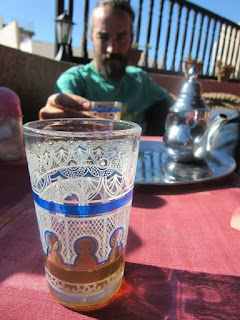Monday, May 31, 2021
Risk and Reward
Wednesday, September 30, 2020
Developing a Practice
Yogas chitta-vritti-nirodhah
Chitta is all the stuff of the
mind, intellect, and ego. Our awareness. Our anxiety. Our identity. Our
conscious, subconscious, and dreams. The stuff that has soaked deep to form the
way we see the world, and see each other. Vrittis are thought waves. “This too
will pass”, but the danger is when we absorb the waves, and identify them. When
we think we are the storms, winds, and rains of challenges that seem to attack
us relentlessly. Money Anxiety comes in this form. Fear of where it will come
from. Fear of where it will go. Fear of the aftermath it will leave. Once
understood, it is possible to develop a practice to control the financial
waves. Working with them rather than fighting. Eventually finding nirodhah
(stillness). Financial Yoga is developing a practice to still the waves of
money anxiety.
Wednesday, April 22, 2020
Bit of a Wet
Wednesday, September 18, 2019
Maximum Drawdown
Thursday, May 11, 2017
Managing Expectations
Saturday, March 19, 2016
Inner Stories
Wednesday, January 13, 2016
What Matters
Tuesday, April 07, 2015
Real Risks (by Jared Licina)
Jared is one of those guys that believes sleep is for when you are dead. I got tired just by hearing stories of what he was up to or seeing his name pop up repeatedly on lists of organisers at university. Very involved in debating at school, I was hoping he would be keen on sharing some of his thoughts on this blog, and that is the case. Jared thinks about life deeply and seems to pack in enough for three or four people. On top of that, he is good people.
Real Risk
by Jared Licina
Some of the posts within this blog have looked at how people are notoriously bad at calculating risk in their daily lives, to make logical decisions about what really impacts them. But why, and how can you overcome this? As a public service, we can look at what REALLY is threatening you these days. I started this article as a backlash against some recent adverts for various superfoods, but what I found was interesting...
Thursday, October 02, 2008
Many Tongues
I have always felt like only speaking English and Afrikaans (badly), with feeble introductory efforts at Xhosa and Zulu really holds me back from masses of ideas.
Recently in a fit of inspiration I made a valiant attempt at conquering German. I am going to try and keep that up.
I think language is incredibly powerful in ways beyond what we imagine. I believe it is quite possible that a large part of our personalities is determined by the language in which we are thinking and speaking. Culture and language are intertwined with humour and creativity. I believe that without learning other languages we are completely cutting off entire sides of our personality.
An obvious inhibitor is the wealth of literature that a purely English only speaker is restricted from. I am forced to read translations of Dostoevsky which while brilliant likely pale in comparison to the original. My colleague said that if I think English is a punny language, French takes it to a whole new level with subtle changes conveying a whole range of meanings. I would love to be able to enjoy different kinds of humour, philosophy, creativity and expression in their original form.
But, you can't learn a language in a book. This colleague achieved his feat by being the son of an ambassador and moving from country to country being forced to learn a new language. He never spent more than 4 years at a single school.
I spent years learning Afrikaans and I am still atrocious.
One of the reasons is that as an English speaker, learning another language is a nice to do. There is no need. In addition, we tend to be very condescending of foreign language speakers struggling with their English and judge them as stupid. Equally, the barrier of appearing stupid prevents us from being courageous enough to learn a new language.
I am going to try and push forward with German. It is close enough to English that I should have few excuses about difficulty. I have already spent many many hours with the tapes and can tell you what a hair-dresser is, that something is expensive, that I am a health fanatic (hmmm) and count to most numbers. But that is not a language... the real magic is in the subtlety and that is the next level (which 10 years+ of afrikaans didn't get me).
So with i-pods, access to blogs and movies, the Internet, and the lure of book-crazy London in my future, lets see whether Trev can get over the bump and open up a new world to himself.
Exciting Times.




















